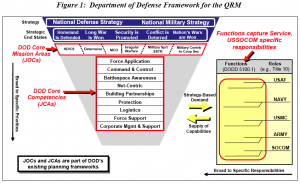 The National Defense Strategy (PDF) of the United States was published under Gates in 2008, and like the Maritime Strategy is a product of the Bush administration. In my opinion, both documents reveal the sad state of grand strategy in U.S. policy formulation, debate or execution today. In the National Defense Strategy of the United States you will find five objectives laid out to be achieved.
The National Defense Strategy (PDF) of the United States was published under Gates in 2008, and like the Maritime Strategy is a product of the Bush administration. In my opinion, both documents reveal the sad state of grand strategy in U.S. policy formulation, debate or execution today. In the National Defense Strategy of the United States you will find five objectives laid out to be achieved.
- Homeland is Defended
- Long War is Won
- Security is Promoted
- Conflict is Deterred
- Nation’s Wars are won
In “A Cooperative Strategy for 21st Century Seapower”, the Maritime Strategy laid out six strategic imperatives, which are treated as the objectives to be achieved with the strategy.
- Limit regional conflict with forward deployed, decisive maritime power
- Deter major power war
- Win our Nation’s wars
- Contribute to homeland defense in depth
- Foster and sustain cooperative relationships with more international partners
- Prevent or contain local disruptions before they impact the global system
The Webster dictionary on my desk defines ‘objective’ as something toward which effort is directed : an aim, goal, or end of action.
However you look at the objectives, or strategic imperatives, one conclusion that can be reached is that these are not strategic end states that achieve a policy conclusion, rather they strive to reach a policy condition. The distinction is important, because a strategy built towards seeking a policy conclusion must be comprehensive to align itself with specific, Grand Strategy goals of a nation state. Conversely, a strategy built towards achieving policy a condition is not aligned with a Grand Strategy, rather seeks goals that maintain a state within the context of the conditions being imposed on the state. Absent Grand Strategy, the end state is a condition rather than a conclusion. Policies without clearly articulated objectives are the weak foundation for any strategy.
The DoD does not make policy, the DoD develops strategies from policy and executes that strategy to achieve policy goals. That leads back to the question of what policy goals are trying to be achieved, or said another way, what are the Obama administrations national security policy objectives for America?
The challenge all the military services are facing isn’t a void in strategic thinking or direction so much as it has been overcoming ineffective national security policy that miscalculated leveraging opportunities produced during the unipolar world following the cold war. Today we find the US in a position where the Obama administrations National Security Policy simply can’t afford to miscalculate in an emerging multipolar world, or the DoD will find itself strategically unprepared for that world.
A review of the Bush national security policy reveals a political policy seeking a condition, not a conclusion. The Bush administrations 2002 National Security Strategy of the United States stated that following the September 11 attacks, America would:
- launch preventive wars to defend itself against rogue states and terrorists with weapons of mass destruction;
- that it would do this alone, if necessary; and
- that it would work to democratize the greater Middle East as a long-term solution to the terrorist problem.
The problem with this was that it did not set forth end goals, it set forth conditional goals. The Bush policy explicitly laid out a vision of American power and opportunity as seen following the end of the cold war, with America as the unipolar actor, and then stated that America should use this opportunity to try to prolong the period of opportunity. The policy of retaining our freedom and ability to act as we saw necessary never stated for what conclusion we would be acting towards, it was purely a conditional policy of having the freedom and ability act. Even the conclusion of achieving a solution to the terrorist problem came with a conditional goal, specifically democracy.
The Obama administration has not laid out a National Security Strategy of the United States yet, or at least released one to the public, which raises questions what kind of National Defense Strategy might develop as a result of the QDR process. If the QDR will assess the threats and challenges the nation faces and re-balance DoD’s strategies, capabilities and forces to address today’s conflicts and tomorrow’s threats, should it not be guided by the National Security Strategy set forth by the Obama administration? If the DoD is developing strategies absent a National Security Strategy, how can that strategy clearly articulate a conclusion, or end state for strategy? Are we simply developing another series of defense strategy documents with conditional objectives?
It is my sincere hope that the Obama administration recognizes that conditional goals have consistently resulted in ineffective policies. For example, isolation of North Korea and Iran were conditional goals laid out by previous administrations, the isolation of North Korea being a conditional goal for decades and not surprisingly, has not resulted in a conclusion. An alternative approach for the Obama administration should be to clearly articulate the desired end state of North Korea, for example, ending the Korean War that never reached a conclusion. The same should be said for Iran, something like Nuclear power yes, nuclear weapons no, and articulate clearly the severe measures that will be taken to achieve that national security policy conclusion.
Keep in mind these are examples, not necessarily positions I am advocating. NSC-68 was written in 1950 with a clear end goal of defeating the Soviet Union. With that clear end goal stated, that National Security Strategy endured for 5 straight presidential cycles, and the Soviet Union wasn’t actually defeated until 4 decades after NSC-68 was written. Still, NSC-68 was an enduring document primarily because it had a clear policy end state defined to be achieved.
The point is, open ended conditional national security policies have a history of failure, because they lead to national defense strategies that fight symptoms instead of directly aligning strategy to address problems. Conditional goals leave too much ambiguity to effectively achieve a policy objective as a conclusion, and that is particularly true with military forces. The strategy in Iraq with the conditional goal of training Iraqi’s for transitioning security to Iraqi forces did not work, but when the end goal became a clear end state of protecting the population from the enemy, it worked.
As the DoD develops the next series of strategic documents, it is my sincere hope that when conditional goals are stated as an end in policy, the DoD seeks clarification of policy instead of simply accepting the condition as a foundation for strategy. Conditions are not effective end states for strategies, conclusions are. Without well defined conclusions, strategy cannot be well defined and will not be well aligned towards achieving positive policy objectives.

